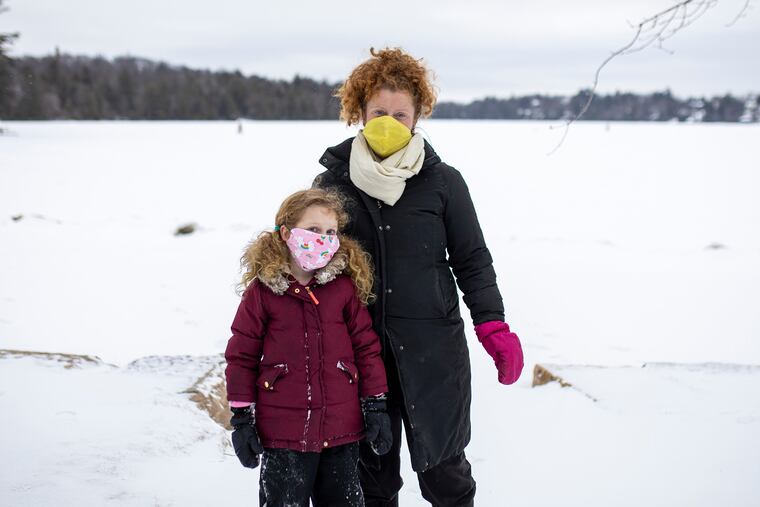This Manhattan family went to rural Pennsylvania to escape COVID-19. Will they stay?
Caroline Goldrick traded Manhattan, population 1.6 million, for Eagles Mere, Pa., population 143.

EAGLES MERE, Pa. — Silence filled the sidewalks and streets, even the sky above the big city, but Caroline Goldrick heard a new sound from the seventh-floor apartment on Broadway. It was the early months of the COVID-19 pandemic, and down below, in a funeral home parking lot, a refrigerated box truck hummed day and night to keep the new corpses cold.
In July, Goldrick, her husband, Christian, and their daughter, Edith, borrowed a car, left two cats in the hands of a caretaker, and traded Upper Manhattan for rural Pennsylvania, to a family member’s home in idyllic Eagles Mere, in Sullivan County, 175 miles to the northwest. When the summer residents left this tourist town, mother and daughter stayed. They watched the leaves turn, and come fall, saw more whitetail deer than people. Lately, winter’s taught them what silence truly is.
“There’s noise, but it’s usually just the wind,” Goldrick said.
Calls for social distancing, coupled with the increased ability to work from home, or anywhere, have made stories like Goldrick’s far more common. In May, real estate agents in rural Pennsylvania, including some in Sullivan County, said they hadn’t seen the same kind of rush to rent and purchase homes there since 9/11. Many people bought homes sight unseen, paying more than the asking price. Some short-term rentals on Craigslist promised renters would “never” get coronavirus in those remote locations.
Goldrick, who teaches musical theater at a New York City public school, said she and her husband had initial concerns about traveling to Eagles Mere. They rarely left their apartment, save for groceries and brief trips to Inwood Hill Park by the Hudson River.
“We’d heard people were roaming free without masks on the beach,” she said of Eagles Mere. “As we started to go a little bit more crazy at home, though, we decided if it’s too much, we’ll just come home.”
Sullivan County is second-to-last in population density among Pennsylvania’s 67 counties, with 14.1 people per square mile. There have been 242 confirmed cases of COVID-19 there and 12 confirmed deaths. Manhattan’s population density is 69,468 per square mile, and New York City as a whole has averaged 5,288 new cases of coronavirus per day. Goldrick said she began to feel the squeeze of the city early on.
“I feel like we were traumatized a little,” she said.
On a gray January afternoon, Goldrick, 48, and Edith stepped out onto frozen Eagles Mere Lake during one of their daily walks. Their boots crunched the snow and a distant woodpecker’s hammering echoed across the ice. One other person was on the lake, flying a kite. Two cars passed by on the lakefront road in an hour.
Edith made snow angels. She said the lake is her favorite part of Eagles Mere, though she prefers when she can swim and get ice cream in the summer. When asked if she wanted to return home, to New York City, she thought hard for a few seconds.
“Maybe,” she said.
Edith misses her cats more than her friends. She can see friends on Zoom.
Goldrick was teaching remotely before summer break, but her theater program was put on pause for the new school year. Her husband still works in the city, for a nonprofit, during the week, and he often returns to Eagles Mere on weekends. Edith is in first grade, and taught at home with a combination of a Vermont-based homeschool program and New York City curriculum and check-ins with teachers via Zoom.
Goldrick said she acknowledges the privilege of her situation and feels “incredibly lucky” to have a place to escape when millions don’t. A self-professed “talker,” she misses her circle of friends, though, the current that courses through city life.
“No one moves to New York City to sit in their apartment,” she said. “People who complain about all the people there shouldn’t move to the city.”
There’s been much debate about the future of that city life, whether work from home will cement into something permanent, making office space redundant. Urbanists worry whether density will become a dirtier word, whether fear of crowded public transportation will ramp up automobile usage. Newspapers have published op-eds that claim New York City is “dead forever,” along with rebuttals.
Goldrick doesn’t own a car but said it’s impossible to get around without one in rural Pennsylvania. The friend borrowed the Saturn she’s using now works in theater on Broadway and will one day need it back. Internet connection in rural areas is often spotty, too.
Goldrick can’t stay in her brother-in-law’s Eagles Mere home forever, but the vaccine rollout and approaching spring months, when more people can gather outdoors, are encouraging signs for a possible return by as early as next month. Then again, she and her husband often rent a cabin in Eagles Mere for July. Like her daughter, Goldrick’s settled on “maybe.”
“We’ve been kind of playing it month by month. It was, ‘Well, maybe after Thanksgiving,’ and then, ‘Maybe after Christmas,’ and we’re still here,” she said. “I feel very lucky to be here, and lucky that my daughter and I are not sick, but I miss the city.”